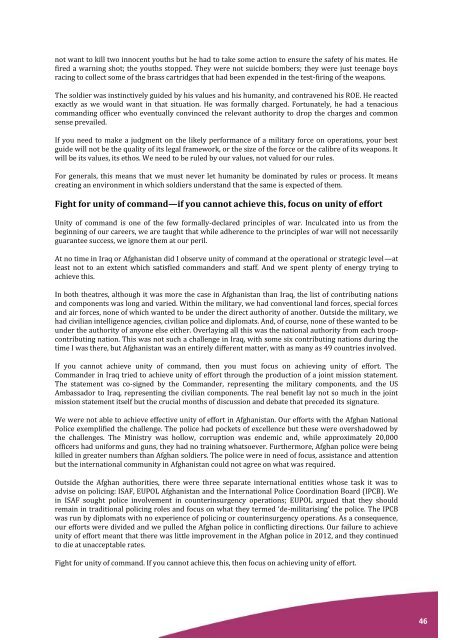Issue No 198 2015
198 2015 Nov_Dec
198 2015 Nov_Dec
Create successful ePaper yourself
Turn your PDF publications into a flip-book with our unique Google optimized e-Paper software.
not want to kill two innocent youths but he had to take some action to ensure the safety of his mates. He<br />
fired a warning shot; the youths stopped. They were not suicide bombers; they were just teenage boys<br />
racing to collect some of the brass cartridges that had been expended in the test-firing of the weapons.<br />
The soldier was instinctively guided by his values and his humanity, and contravened his ROE. He reacted<br />
exactly as we would want in that situation. He was formally charged. Fortunately, he had a tenacious<br />
commanding officer who eventually convinced the relevant authority to drop the charges and common<br />
sense prevailed.<br />
If you need to make a judgment on the likely performance of a military force on operations, your best<br />
guide will not be the quality of its legal framework, or the size of the force or the calibre of its weapons. It<br />
will be its values, its ethos. We need to be ruled by our values, not valued for our rules.<br />
For generals, this means that we must never let humanity be dominated by rules or process. It means<br />
creating an environment in which soldiers understand that the same is expected of them.<br />
Fight for unity of command—if you cannot achieve this, focus on unity of effort<br />
Unity of command is one of the few formally-declared principles of war. Inculcated into us from the<br />
beginning of our careers, we are taught that while adherence to the principles of war will not necessarily<br />
guarantee success, we ignore them at our peril.<br />
At no time in Iraq or Afghanistan did I observe unity of command at the operational or strategic level—at<br />
least not to an extent which satisfied commanders and staff. And we spent plenty of energy trying to<br />
achieve this.<br />
In both theatres, although it was more the case in Afghanistan than Iraq, the list of contributing nations<br />
and components was long and varied. Within the military, we had conventional land forces, special forces<br />
and air forces, none of which wanted to be under the direct authority of another. Outside the military, we<br />
had civilian intelligence agencies, civilian police and diplomats. And, of course, none of these wanted to be<br />
under the authority of anyone else either. Overlaying all this was the national authority from each troopcontributing<br />
nation. This was not such a challenge in Iraq, with some six contributing nations during the<br />
time I was there, but Afghanistan was an entirely different matter, with as many as 49 countries involved.<br />
If you cannot achieve unity of command, then you must focus on achieving unity of effort. The<br />
Commander in Iraq tried to achieve unity of effort through the production of a joint mission statement.<br />
The statement was co-signed by the Commander, representing the military components, and the US<br />
Ambassador to Iraq, representing the civilian components. The real benefit lay not so much in the joint<br />
mission statement itself but the crucial months of discussion and debate that preceded its signature.<br />
We were not able to achieve effective unity of effort in Afghanistan. Our efforts with the Afghan National<br />
Police exemplified the challenge. The police had pockets of excellence but these were overshadowed by<br />
the challenges. The Ministry was hollow, corruption was endemic and, while approximately 20,000<br />
officers had uniforms and guns, they had no training whatsoever. Furthermore, Afghan police were being<br />
killed in greater numbers than Afghan soldiers. The police were in need of focus, assistance and attention<br />
but the international community in Afghanistan could not agree on what was required.<br />
Outside the Afghan authorities, there were three separate international entities whose task it was to<br />
advise on policing: ISAF, EUPOL Afghanistan and the International Police Coordination Board (IPCB). We<br />
in ISAF sought police involvement in counterinsurgency operations; EUPOL argued that they should<br />
remain in traditional policing roles and focus on what they termed ‘de-militarising’ the police. The IPCB<br />
was run by diplomats with no experience of policing or counterinsurgency operations. As a consequence,<br />
our efforts were divided and we pulled the Afghan police in conflicting directions. Our failure to achieve<br />
unity of effort meant that there was little improvement in the Afghan police in 2012, and they continued<br />
to die at unacceptable rates.<br />
Fight for unity of command. If you cannot achieve this, then focus on achieving unity of effort.<br />
46


